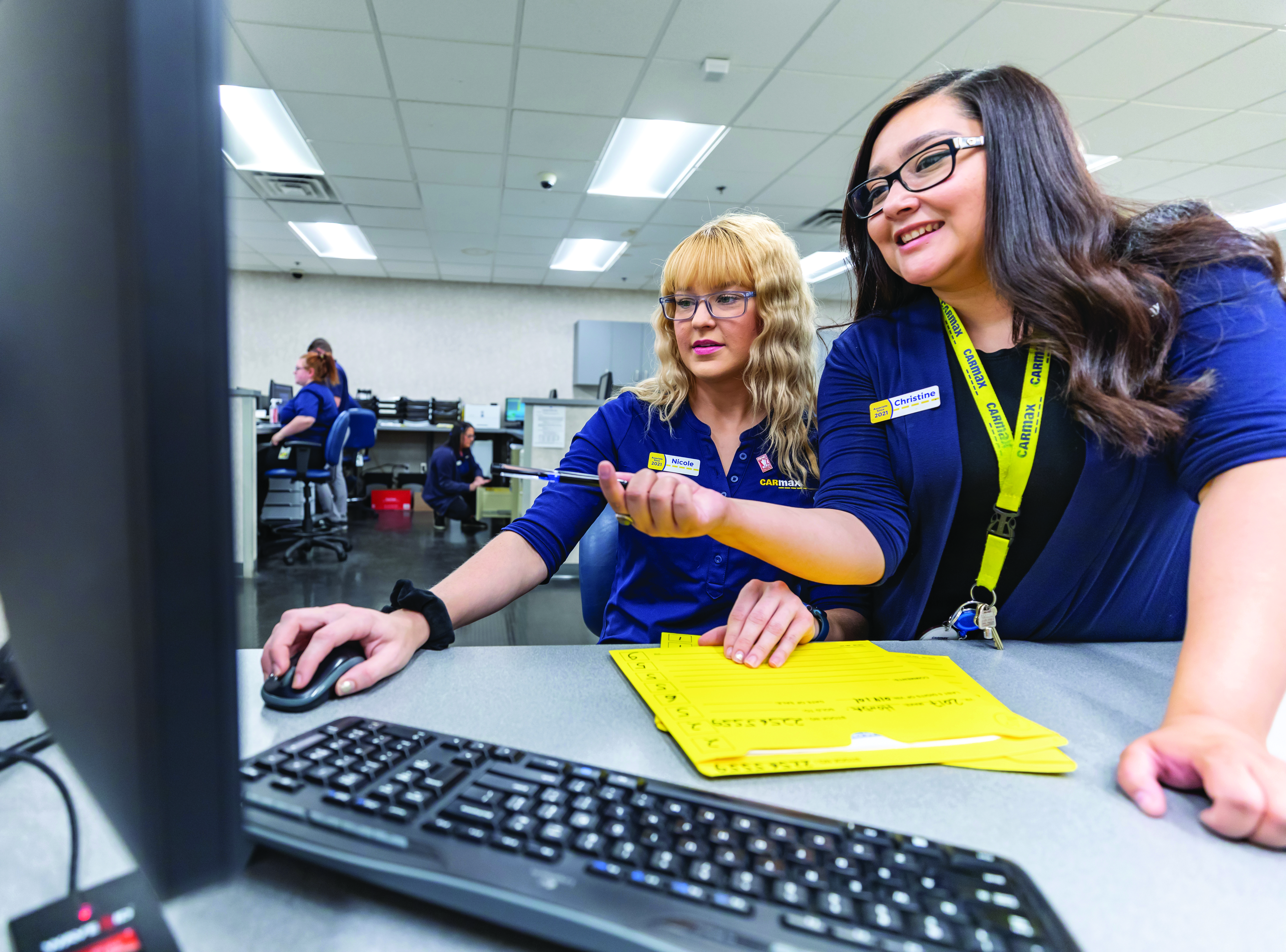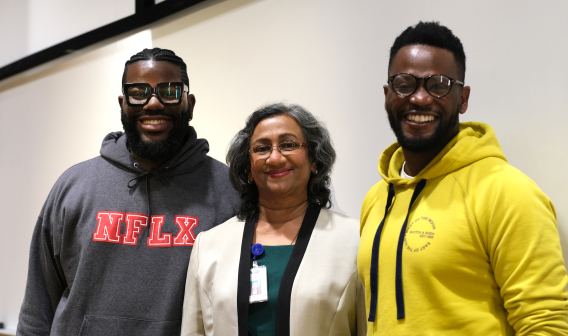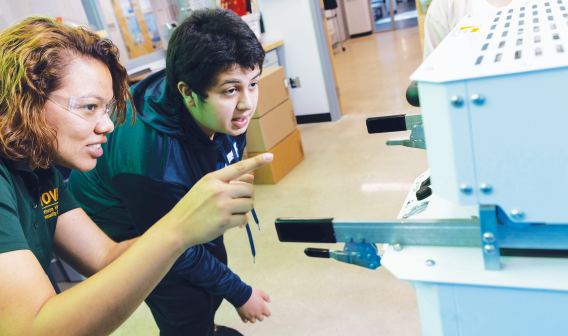'I Can’t Imagine Ever Living Without This’
Pioneered and powered in Virginia, artificial intelligence emerges as a key problem-solving tool

CarMax, Goochland County
Artificial Intelligence may seem like a new technology, but CarMax has been using it for years.
The Goochland County-based company is the country’s largest seller of used cars. Figuring out how to price cars at scale is where an algorithm, also known as AI, is an essential tool, said CarMax Chief Data Officer and Head of Business Strategy & Analytics Gautam Puranik.
What has changed recently is how CarMax uses AI — and it has ambitious plans for using the technology in the future.
“We’re now leveraging AI to come up with the right answers to the most complicated customer questions,” Puranik said.
That’s helpful to the company’s employees, as well as customers purchasing one of CarMax’s used vehicles. And it may only be the start of how AI complements human efforts to make the car-buying experience better than it’s ever been.
Puranik said, “My dream is that AI can help us get to a place where there is no pothole and every customer transaction, every journey, is as seamless, as smooth as possible.”
It’s been less than two years since OpenAI released its first version of ChatGPT, the groundbreaking AI tool that can not only analyze and categorize, but create new content as well. Known as generative AI, this smarter, more flexible version of artificial intelligence offers organizations the possibility of revolutionizing not only how work is done, but who does what. Experts say the day is soon coming when generative AI can take over routine work while highly skilled employees are able to spend more time on strategic customer-driven activities.
“AI is one of those seismic changes,” said Vinnie Schoenfelder, principal and chief technology officer at Richmond-based consulting firm CapTech Ventures, Inc. “Thirty years from now, when my children are looking back at this, they’re going to say, ‘I can’t imagine ever living without this in my life,’ the same way we say that about a handheld device or the internet. That’s how big of a change it is.”
Powered by Virginia Infrastructure
The power and promise of AI is particularly relevant to Virginia. Major companies across the technology space are funding AI research right now, and most of them (Amazon, Microsoft, Google, IBM) have a significant presence in the Commonwealth. Northern Virginia alone is home to 35% of the world’s known hyperscale data centers, which lay the foundation for that AI activity to happen.
“Since we’ve been building large-scale data centers for more than 15 years and GPU-based servers for more than 12 years, we have a massive existing footprint for AI infrastructure around the world,” said Shannon Kellogg, vice president of public policy at Amazon. “Virginia is a very, very big part of that infrastructure.”
Meanwhile, the next generation of workers who will develop AI is training now at the Commonwealth’s colleges and universities, including Virginia Tech’s Sanghani Center for AI and Data Analytics, the University of Virginia Darden School of Business’s Artificial Intelligence Initiative and the university’s new School of Data Science, Virginia Commonwealth University’s AI Futures Lab and newly launched minor in practical artificial intelligence, and George Mason University’s Center for Mathematics and Artificial Intelligence. Together, they offer an ideal ecosystem to attract and grow AI-related companies.
But the technology also comes with risks. A November 2023 report from consulting firm Deloitte lays out three main concerns:
- Generative AI has an unfortunate tendency to make things up and believe its own falsehoods — the technical term for this is “hallucinating.”
- It’s only as good as the data it’s been trained on, and if those datasets have bias, the AI will as well.
- Finally, it can put privacy at risk by exposing data from queries or training to developers.
That’s why organizations must not set AI free, but insist its power be harnessed by people who oversee and modulate its output every step of the way, said Hariharan Murthy, a managing director of Deloitte Consulting LLP, and a co-author of the Deloitte report.
“AI does not replace humans. It accentuates and elevates humans,” Murthy said. “You need to put the human in the loop.”
AI does not replace humans. It accentuates and elevates humans. You need to put the human in the loop.
Constructing the Proper Guardrails
At CarMax, this meant, in part, creating an AI Center of Excellence charged with evaluating risks and erecting guardrails around this promising and potent new technology. A cross-functional unit, it’s staffed with leaders from across the company, from lawyers to information security experts, data scientists, and engineers, Puranik said.
“We encourage open conversations about what could be the biases, what could be the risks, what kind of things can happen,” he explained. “We have a pretty thorough conversation before we make any decision on how to use AI, and that’s another reason why actually asking questions is encouraged, as opposed to not.”
At CarMax, any use of generative AI must pass two more tests as well. AI must be leveraged for a purpose. It can’t be used just because it’s cool and exciting, but because it solves a customer problem. Any new AI tool must be tested by employees, who are asked to be honest in their feedback so any issues can be spotted and fixed before the new technology is rolled out to customers.
“Our mission is all about integrity and transparency,” Puranik said. “Therefore, whether it’s generative AI or nongenerative AI, our key principle is really based on making sure we’re leveraging these tools to do the right thing by our customers and for our associates.”
Fairfax County-based Capital One Financial Corporation is also pouring energy and attention into AI in a bid to transform and simplify its interactions with customers, and customers’ interactions with finance.
“Our ability to apply data and AI to understand our customers’ needs, goals, and pain points means…we can continue to deliver tremendous value to people in all different spheres of their lives, and we can do it at scale to over 100 million customers,” said Prem Natarajan, the financial service company’s chief scientist and head of enterprise AI.
Already, Capital One is using generative AI to summarize emails and documents, and to help analysts discover and use relevant data to make decisions. At each step, the goal is to transfer the burden of mundane tasks from humans to systems.
“To me, AI is ultimately about empowering people so they can spend more time on more satisfying, more high-value tasks,” Natarajan said.
Enhancing the Human Touch
This may be of particular use to government workers, said Joe Mariani, a senior research manager with Deloitte’s Center for Government Insights.
In reviewing data for an April 2024 report on generative AI and government work, Mariani and his co-authors found that the top task for all government workers, whether state or federal, was documenting and recording information: 400 million hours a year for federal workers, and about 10 million hours per year for government workers in a mid-sized state.
But in one trial, using generative AI to assist with researching and writing a report for an intelligence agency, the workers produced a report in 20 hours that would ordinarily have taken 120 hours. “That 80% savings opens an aperture to do lots of stuff with that time,” Mariani said.
What kinds of things? That’s where Mariani believes the future “gets really exciting. There are opportunities to do entirely new things and new types of work that we’re not doing today, and accomplish the outcomes the public wants in fundamentally new ways. The horizon stretches out much farther.”
That doesn’t mean generative AI will transport human workers to some kind of employment Shangri-La, with as much time as they need to complete interesting, complex tasks.
“I’ve been told my whole life that computers are going to allow us to work less. We don’t work less,” Schoenfelder said.
He believes AI will offer a similar kind of transformation — the ability for workers to do more in less time. It may not yet be clear how that will happen, what work AI can safely do, and where all the pitfalls lie. But when it comes to a disruptive technology like AI, caution is not a leader’s friend.
“Those who know how to use it are going to perform better than those who don’t,” Schoenfelder said. “That was the same thing with computers. It was the same thing with mobiles. The same thing with the internet. There’s always change and the people who are not frightened by change, but are excited by it, and want to know how they can do more with it, will outpace the others.”




